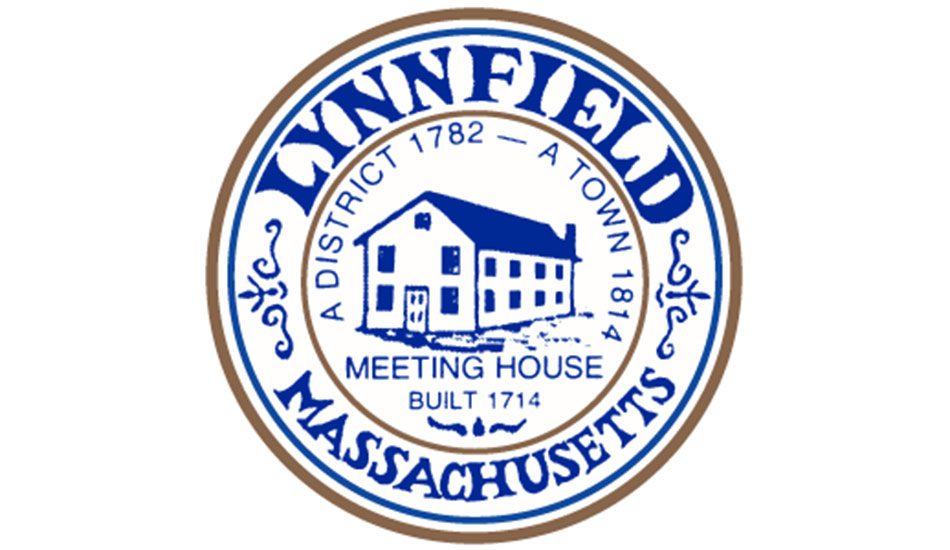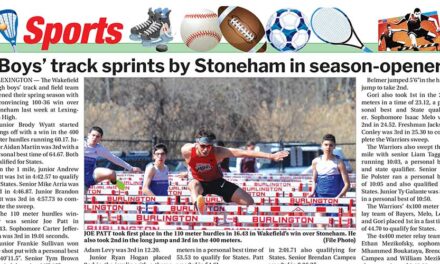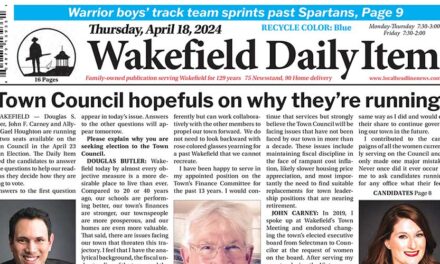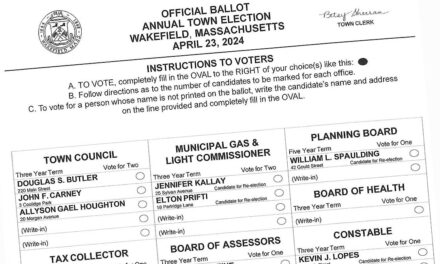By DAN TOMASELLO
LYNNFIELD — The town is facing a crossroads over whether to comply with new multi-family zoning district regulations that are being mandated by the state.
Planning and Conservation Director Emilie Cademartori recalled during the Select Board’s April 25 meeting that Gov. Charlie Baker signed into law an Economic Development bill in February 2021, which amended the state Zoning Act. The law change includes new regulations that require MBTA communities to have at least one multi-family housing zoning district as of right.
“We don’t have a train or a bus, but we are considered an MBTA adjacent community,” said Cademartori. “Therefore, this Zoning Reform Act does apply to Lynnfield. The Economic Recovery and Reform bill was primarily focused on COVID relief. Gov. Charlie Baker has sought for many years to amend Section 3A of Chapter 40A to stimulate housing production in the state. That is why this piece of zoning reform was included with COVID relief.”
Cademartori said the law changed voting requirements for approving multi-family developments.
“For example, if a multi-family project came before Town Meeting, it used to require a two-thirds vote to pass,” said Cademartori. “It now requires a simple majority. The same thing is true if a project came before the Planning Board or the Zoning Board of Appeals.”
Cademartori said the law mandates most MBTA communities to create “a new multi-family zoning district.” Avon and Boston are exempt from the new regulations.
“It is intended that the district be a minimum size of 50 acres and has a minimum gross density of 15 units per acre,” said Cademartori. “For Lynnfield, that type of zoning district would allow up to 750 units. That would represent more than 15 percent of the town’s total housing stock. It is a pretty tough ask for Lynnfield because the town has limited water and sewer availability. However, the state has said to municipalities they shall do it. If communities don’t, there will be certain state funds withheld.”
If MBTA communities or MBTA adjacent communities such as Lynnfield do not create a multi-family zoning district that complies with the revised Zoning Act regulations, Cademartori said the town will be ineligible to receive grant funds from the Housing Choice Initiative, the Local Capital Projects Fund and the MassWorks Infrastructure Program. She said the town has never been awarded grants from the three different state programs.
“The state has left it open that they may include additional state grants,” said Cademartori.
Cademartori said presenting to the Select Board was the first step in the process of making sure the town complies with the new regulations for MBTA communities even though the town is not in compliance with the law change. She said the town will be in “interim compliance” next year, and said the town will need to submit an action plan detailing how Lynnfield will comply with the regulations in a three-year period.
“I can do some math and look at some maps to see where we can fit a multi-family zoning district in town,” said Cademartori. “We can choose to pursue it or not pursue it right away. It will obviously have to go before Town Meeting. The state may tell towns they have to do this, but it still has to pass Town Meeting. We can put a plan into place if we choose to attempt this, or we can wait and see how the state reacts.”
While Cademartori noted that the law change does not mandate MBTA communities or adjacent communities to build multi-family developments, she said the state is mandating communities to “adopt zoning” that would allow an individual or a company to build a multi-family development.
“It doesn’t mean we have to actually produce a single unit,” said Cademartori. “It is sort of silly, but that is the way it is set up.”
Cademartori said the state is offering technical assistance to help municipalities find potential multi-family zoning district locations.
“There has been a lot of criticism from municipalities, especially those that don’t have sewer systems,” said Cademartori. “I suspect the guidelines may change and there may be some reduction in the total number of units. The feedback that the state has gotten over the last few months has been pretty harsh.”
Select Board member Dick Dalton slammed the new changes to the Zoning Act.
“This is the most ill-conceived piece of legislation I have ever seen in all of the years I have been involved in politics,” said Dalton. “It is poorly written legislation that has one problem after another. We have the state telling us how we should manage the growth of our town and the future of our town when they can’t manage the MBTA, the RMV or veterans’ hospitals. The whole thing is a sham. I don’t see how this is going to get watered down.”
Dalton said he hoped local officials will object to the new Zoning Act rules for MBTA adjacent communities.
“If this were ever adopted, it could cause long-term damage to this town,” said Dalton.
After Baker signed the Economic Development bill into law, Cademartori said she did not believe that the Zoning Act’s changes would be “insurmountable.”
“It did not include these guidelines with the floor number of 750 units,” said Cademartori. “We could have created a multi-family zoning district. We could have changed Boston Sports Club’s location and made it multi-family by right. We could have found pockets where we could have made smaller projects by right.”
Cademartori said it will be up to the Select Board to notify the Planning Board whether to pursue identifying a potential multi-family zoning district location.
Select Board member Joe Connell expressed concerns about the town allowing a large multi-family zoning district to be created because it could lead to a large development getting built.
“It would impact our school system, the Police Department and the Fire Department,” said Connell.
Connell said local officials should get cost estimates about the budgetary impact a multi-family zoning district will have on the town.
In response to a question from Connell, Cademartori said the multi-family zoning district cannot be “age restricted” by making it elderly housing.
“The law change is intended to increase family housing stock,” said Cademartori.
While local officials in municipalities such as Lynnfield have criticized the Zoning Act’s changes, The Salem News reported last month that Housing and Economic Development Secretary Mike Kennealy told North Shore officials at the Hawthorne Hotel in Salem that more has to be done to address the state’s housing crisis. He said the problem has been driving up homelessness across the state, and has made it difficult for young families and seniors to find an affordable place to live.
“We have to get our arms around the housing crisis,” said Kennealy. “Literally, the future of Massachusetts depends on it.”





